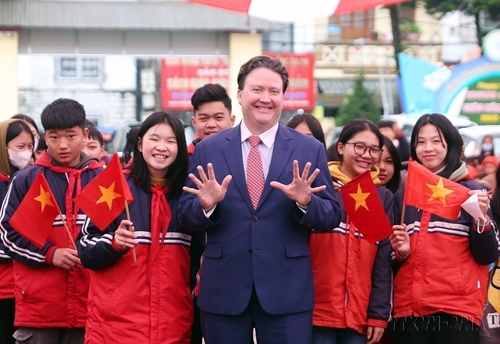Major pillars of cooperation
Knapper described the economic relationship as a significant pillar, noting that Vietnam has become the U.S.’s eighth largest trading partner, while the U.S. stands as Vietnam’s largest export market. The U.S.'s investment in Vietnam has continued to increased, while Vietnamese investors are increasingly eyeing opportunities in the U.S.
A largest-ever delegation of over 100 Vietnamese investors, led by Deputy Minister of Finance Cao Anh Tuan, attended the 2025 SelectUSA Investment Summit in May, underscoring Vietnam’s burgeoning interest in investing in the U.S.
    |
 |
|
U.S. Ambassador to Vietnam Marc E. Knapper at an event in Sa Pa in 2023 |
Another pillar, he said, is education cooperation. Vietnam is now the sixth largest source of foreign students in the U.S., with round 30,000 students studying in the American country, and up to 300,000 attending short-term courses such as summer camps and semesters. Knapper also expected to see more U.S. students, scholars, and researchers coming to Vietnam.
In April, a delegation of representatives of 21 U.S. universities visited Vietnam, and 20 of them are actively engaged in discussions with Vietnamese higher education institutions to increase the exchange of students and scholars. The U.S.’s Fulbright Program, including Fulbright University Vietnam, remains a flagship initiative supported by both governments.
The U.S. is committed to supporting Vietnam’s push to gradually turn English into a second language in schools, considering it a critical step toward opening up opportunities in terms of hi-tech and education, he said.
Health cooperation has become another pillar of the bilateral ties, beginning with joint efforts to combat HIV/AIDS through the U.S. President’s Emergency Plan for AIDS Relief (PEPFAR) in 2005, later expanding to address tuberculosis and COVID-19.
He recalled Vietnam's provision of protective equipment for the U.S. in its time of need, followed by the U.S.'s donation of 44 million doses of Pfizer vaccine against COVID-19 for Vietnam. Looking ahead, the ambassador stressed that cooperation in health surveillance will be an important aspect to deal with future pandemics.
Defense ties are also an important pillar of the bilateral relationship. In terms of hi-tech and semiconductor cooperation, Knapper described the Joint Statement on the upgrade of bilateral ties to a Comprehensive Strategic Partnership in September 2023, signed by Party General Secretary Nguyen Phu Trong and President Joe Biden, as a "historic achievement," with both sides valuing collaboration in high technology, particularly semiconductors. The two countries recognized Vietnam’s readiness and potential to integrate more deeply into the global hi-tech value chain.
In hi-tech collaboration, the U.S. Government is working closely with domestic universities, such as Arizona State University, to partner with Vietnamese educational institutions in developing high-tech curricula, particularly in semiconductors, aiming to build Vietnam’s capacity to train a skilled workforce. Other universities, including Purdue and Portland State, are also engaged in similar efforts.
At the same time, U.S. tech companies are investing in workforce training to meet the growing demand for skilled workers in semiconductor manufacturing and chip design factories, enabling Vietnam to play a more significant role in the global high-tech value chain and realize its ambition to become a regional and global semiconductor hub.
Recent visits by Tim Cook of Apple, Jensen Huang of Nvidia, and Qualcomm leaders, who announced the acquisition of Vingroup’s AI division, underscored the growing interest in Vietnam’s technology future, he said.
The U.S. Government, businesses, and education establishments wants to become part of Vietnam’s hi-tech future, the diplomat said.
The past three decades have witnessed the expanded and deepened mutual trust and understanding between the two countries, Knapper said, adding that Vietnam and the U.S. have shared common interests and goals, and cooperated with each other to address many issues from healthcare and cybersecurity to combating transnational crimes such as human and drug trafficking.
For common prosperity
Regarding orientations for developing the bilateral relations in the coming time, Knapper said the U.S. remains committed to fostering a healthy, balanced trade relationship that benefits both nations and supports shared prosperity. The U.S. Government also wants to ensure that U.S. companies would operate in Vietnam on a level playing field, while also creating favorable conditions for Vietnamese firms to successfully do business in the U.S. market.
Vietnam, he noted, has been proactive and constructive in trade discussions, particularly regarding tariffs. Vietnamese Party General Secretary To Lam was among the first foreign leaders to hold phone talks with U.S. President Donald Trump following the U.S.'s announcement of reciprocal tariff policy, the ambassador noted.
The high-level phone talks between Party General Secretary To Lam and President Donald Trump, along with activities of high-ranking delegations of the two nations, demonstrated that Vietnam-U.S. relationship is at its strongest stage, marked by mutual respect and a shared commitment to advancing the ties for the benefit of both countries' people, he added.
The diplomat also noted strong optimism among U.S. enterprises regarding Vietnam as a partner, market and production hub, particularly in high-tech manufacturing.
According to the diplomat, Vietnam’s recent efforts to streamline administrative units and adopt a two-tier local administration model will improve decision-making, project approval, and investment licensing processes.
Vietnam’s focus on empowering its private sector, advancing hi-tech industries, and developing digital infrastructure will make it an even more appealing hub for trade and investment, he said, hoping to see more Vietnamese companies investing in the U.S.
Mentioning programs on the settlement of war aftermath, a foundation of political relations between the two countries, Knapper affirmed that they have been maintained.
Following a comprehensive review of the U.S.'s foreign assistance programs, projects related to unexploded ordnance (UXO) clearance, dioxin remediation, and support for those with disabilities, as well as joint search for servicemen missing in action (POW/MIA) from both sides, have all resumed after a temporary pause.
In his conclusion, Knapper expressed his firm belief in the future of stronger cooperation and development between the two countries.
Source: VNA